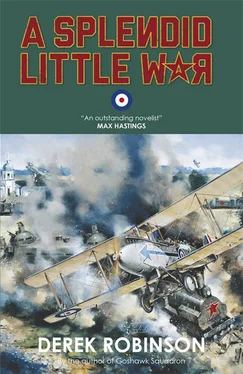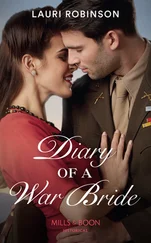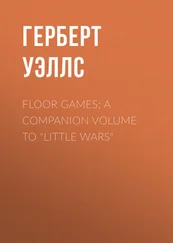“A long time doesn’t mean a couple of weeks,” he said. “It means a month or more. You’ll get new high-speed locomotives and you’ll have express-train status. Denikin sees your squadron as the spearhead of his advance.”
“How do you know all this? We haven’t had our orders from H.Q.”
“Lacey, old pal. You have been away too long from the corridors of power. Staff officers at the British Mission H.Q. are desperate for the essentials of war. I speak of Cooper’s Oxford marmalade, hot English mustard, Gentleman’s Relish, blades for the Gillette safety razor, the latest novel by Edgar Wallace, Bristol Cream sherry, ten-year-old malt whisky, Edinburgh shortcake, green ink, and many more.”
“Green ink is a red herring, surely.”
“Not a bit. A brigadier at H.Q. was distraught when a servant spilled his only bottle. He always signed orders in green ink. He was famous for it. When I rode to his rescue, we became firm friends. Denikin’s advance has given him something to brag about, and he enjoys bragging to me.”
“Express trains,” Lacey said. “Golly.”
“I took the liberty of doubling the size of your orders,” Henry said. “It’s all in a boxcar that is being hooked right now to the end of your train. H.Q. found replacements for your Camel and DH9. They’re on a flatbed car. Fuel and ammo are separate.”
“The green ink still intrigues me. Doesn’t Russia make it?”
“No. I got on the radio to our man in Constantinople. He put a bottle on the next British destroyer for Novorossisk, along with other essentials.”
“Cooper’s Oxford marmalade,” Lacey said. “Hot English mustard.”
“Have you got an hour to spare?” Henry said. “You might be interested in seeing how Denikin finances his war.”
“Gold from London?”
“This is far better. It amazed me.”
*
Daddy Maynard had never known a girl whom he could honestly call a close friend. His family lived in a former rectory in a remote corner of Wiltshire, chosen because it was handy for Salisbury Plain where his father, a major, spent much of his time on cavalry manoeuvres. There was an older sister, completely indifferent to her brother. Local girls were farming stock, buxom and ruddy: totally unsuitable. In any case, from the age of six, most of his years were spent at boarding schools where girls were as foreign as unicorns.
He went, almost without pause, from school to the Royal Flying Corps, which was just as masculine as school. On leave, as he passed through London, he was aware that the wings on his tunic excited young women, some of them quite attractive. What to do about it? He had no idea. When he went to Russia, he had never held a girl, let alone kissed one. Now he had two girls, one on each side and they were kissing him. Not continuously, but often enough to make him feel he was a hell of a chap.
They were in a droshky , driving along the promenade. “I say, Rex,” Maynard said. “I need some advice.”
Dextry detached himself from his girl. “They’re awfully keen, aren’t they?” he said. “Full of beans.”
“Here’s a technical question. The one on my right keeps kissing me on the lips.”
“Good for her. And for you, I hope.”
“No complaints. But then she puts her tongue in my mouth. I mean, right in.”
“Does she? Does she, by Jove. Well I never. I must try that.” Dextry turned away.
“I can’t talk to her,” Maynard said. “She talks to me, but I don’t understand a word of it.” Dextry wasn’t listening. Maynard returned to the kissing business and wondered if he was brave enough to do the mouth–tongue thing. He decided to leave it for a while.
Similar encounters were happening in droshkys scattered about Taganrog. Only one thought was cooling the ardour of the air crews. They were hungry. They wanted lunch. Girls were alright, but food and girls would be better. Plus a jug of vodka.
8
Henry had a car. Of course he had a car, a Hispano-Suiza limousine, looted by the Austrian Army in Italy, sold to the German Army, abandoned in the Ukraine, somehow ended up in Taganrog. He drove. They picked up an elderly Russian general who spoke little English and they made their way inland for about five miles. This countryside was not steppe; far from it. There were farms and fields, woods, hills, even a river. The road was cobbled, but at least it was a road. And then, surprisingly, a railway line appeared and ran alongside the road. Both ended when a steep hillside blocked their way.
A guardhouse had been built into the hillside. Armed soldiers stared at the car. The general got out and they saluted him.
“This is the most secret place in Russia,” Henry said. “The old gentleman will vouch for us.” The general raised a hand. “We’re in,” Henry said. “Don’t smile, and don’t touch anything. Fort Knox is Coney Island compared to what’s inside.”
They went through the guardhouse. A junior officer opened a pair of gates that belonged to a small castle and they walked into a cavern that was big enough to take the Imperial Coach with outriders. It was a wine cellar, lined on both sides with racks of bottles. It went into the hillside as far as Lacey could see.
The officer had a lantern. They followed him. “This is all French,” Henry said. “Burgundies, Beaujolais, Château Lafite, various other Rothschilds. All the great reds.” After a couple of hundred yards they reached a crossroads. “The French whites are down there,” he said. They walked on. “I think this is Chianti,” he said. “I’m not very strong on the Italians.” His voice made a slight echo; the walls of wine bottles absorbed sound. After a while he said, “This is what I wanted you to see. The great cave.” The tunnel had been made higher and wider. “Here they keep the champagne. Well, part of the champagne. The good stuff. There’s more elsewhere. In the beginning, the cavern was made for the champagne, but it kept growing and growing.” He pointed to the roof. “Chalk. Temperature and humidity never vary, year round. Have you seen enough?”
“How much more is there?”
“About fifteen miles.”
They walked back to the guardroom, thanked the officer, collected the general, and went and sat in the car.
“Staggering, isn’t it?” Henry said.
“Stupefying. And it all belongs to Denikin?”
“It does now. It was the Tsar’s private wine cellar for generations. I’m told there are a million bottles of champagne in there.”
“So, when Denikin needs some money…”
“He sells off a few thousand bottles and makes a million roubles, maybe two million. And the war goes on.”
9
The accordion-player had his own sense of time. Usually he played three beats to the bar, sometimes four, occasionally five. He was playing a waltz, and his changes of tempo annoyed the violin and the piano. Often they stopped playing and swore at him until he rediscovered three-quarter time.
Dextry was dancing with his girl and he didn’t complain. “The accordion has some Irish blood in him,” he told her. She smiled and hugged him and the accordion went doolally again.
They were in a big, noisy restaurant-bar dance hall. All the squadron were there, because all the droshky drivers had recommended it. “It’s a racket,” Oliphant said. Wragge agreed. “Still, they seem to want us,” he said. “The grub’s hot, the drinks are big, the waiters are friendly, and my girl likes it. Your Number Nines are enjoying themselves.”
“They’re bloody idiots,” Oliphant said.
The bomber crews were competing to see who could get a visible set of footprints on the ceiling. They dragged tables together to make a base for two men to stand on and support a third, whose boot-soles had been blackened with soot. The trick was to turn him upside-down and hoist him. The problem was that they were all drunk, and others were fighting to rock the tables. Those too tired to fight threw things. Fruit, bread rolls, bottles. Two attempts to reach the ceiling failed. The owner looked on as men fell and tables splintered, and he doubled the price of the drinks. The sport lost its novelty. Waiters swept the dance floor clear of debris. The accordion began an eccentric version of “Alexander’s Ragtime Band”. Dancing began again.
Читать дальше











